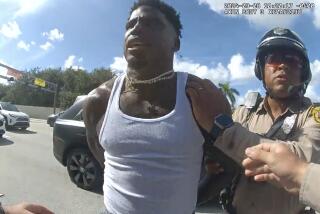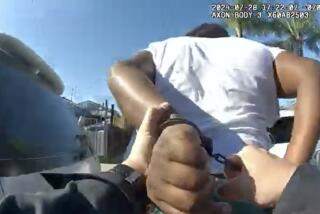CHP Officer’s Testimony, Memo on Beating Differ : Trial: A key prosecution witness’s first report said King ‘kicked and punched’ police. On the stand she said he did not provoke them.
- Share via
SIMI VALLEY — The key testimony of a California Highway Patrol officer against four policemen charged in the assault on Rodney G. King was sharply contradicted Monday when she was shown a copy of a report in which she said the black motorist “kicked and punched” the police.
CHP Officer Melanie Singer, who from the witness stand had insisted that King did nothing to provoke the beating, was shown a copy of the memo she wrote a day after the incident and just hours before the videotape of the assault was shown on television.
In that three-page memo dated March 4, 1991, Singer wrote in detail that King was beaten after he displayed violent behavior that included kicking and punching police officers.
Defense attorney Michael Stone produced the memo in court in an effort to contradict Singer’s testimony that Stone’s client, Officer Laurence M. Powell, used unnecessary and excessive force in repeatedly striking King with his baton.
Over the last two days, viewing the videotape on a large-screen television in the courtroom, Singer had maintained that King only struggled to keep from being handcuffed, but that he never directly assaulted the officers.
Her recollections had been seen as critical since she was in a position to describe the moments from the time King stepped out of his car to when an amateur video cameraman began filming from the balcony of his apartment.
After the videotape was aired, she emerged as a key government witness who had broken the so-called police code of silence and come forward to the Los Angeles County Grand Jury to testify against the four LAPD officers.
In addition to the challenge to her testimony, further questions were raised Monday when her husband and partner on that night, CHP Officer Timothy J. Singer, gave yet another contradictory description of the initial blows to King.
From the stand, Melanie Singer contended that King was on his knees when he was first struck in the head half a dozen times.
But her husband, who followed her as a witness, remembered it differently. He recalled that King took two blows to the head as he was advancing on the officers, and then “staggered and went partially to the ground.”
On the videotape, King is seen being hit only once in the upper body while he is moving toward Powell. He can then be seen falling to the ground, where Powell delivers a series of blows.
Defense attorney Stone has been attempting to show that both Singers mistook baton blows to King’s shoulders and upper arms as “head shots.” At the end of the day Monday, he described her recollections as “not what I would call consistent testimony.”
“Her testimony was shown to be questionable at the least,” he said. “And at some points it was clearly impeached.”
Asked which version was more believable--her official memorandum before seeing the videotape, or her live testimony on the stand--Stone said:
“She was writing down what she saw (in the memo). And the first time is the best recollection because it is the closest to the event.
“And it isn’t the first time in this trial that we’re going to see problems.”
But Terry White, the lead prosecutor in the case, insisted that despite what is seen on the video and despite Timothy Singer’s testimony, the important aspect is that “this man, Rodney King, was hit in the head.”
“She believes this is what she saw, and that’s her testimony,” White said. “The jury will be the one to determine whether she’s credible.” Melanie Singer, asked by Stone to explain the discrepancies, said she meant in her memo that King was only punching “at” the officers. She described King’s kicks and punches as “wild swings” in an attempt to get away from the officers, but not to hurt them.
The memo was marked as an exhibit but has not yet been entered as evidence.
In it, she said King was standing when he “became resistant and began to swing his arms and kick his legs” as police first tried to handcuff him.
When Sgt. Stacey C. Koon, one of the officers on trial, threatened to shoot King with an electric stun gun if he did not lie face down on the ground, “the subject did not comply, but kept kicking the other officers and punching those that got close to put control holds” on him, she wrote.
She said Koon then shot King in the back with a dart from the stun gun. “The subject became almost violent, not faltering at all in his steps,” she wrote. “(He) continued to take swings at the officers.”
She said Koon again shot King with the stun gun. “The subject then dropped to his knees,” she wrote. “It was then that Officer Powell struck the subject several times as the subject fell to the ground.”
That version is markedly different from the one she provided Friday. In the courtroom, Melanie Singer said that except for trying to avoid being handcuffed, King never struck or kicked the officers.
After he was shot with the stun gun twice by Koon, she testified, King fell to his knees and Powell struck him once on the right side of the face, once across the knuckles as he covered his face, and then four times on the right side of the head.
Timothy Singer agreed with his wife that when King first got out of his white Hyundai, he was “moving his feet and shaking his hips, like in a dance.” He also agreed that King was standing when Koon shot him twice with the stun gun.
“I could see that his face was vibrating and convulsing,” Timothy Singer testified.
But Timothy Singer said he remembered that King did not immediately fall down after the second shot from the stun gun.
“He began staggering toward the location where I was,” he said of King. “But before Mr. King reached me, an officer (whom he later identified as Powell) stepped forward and struck Mr. King with a baton.”
The blow, Timothy Singer said, landed on “the right side of his head, above the ear.” Nevertheless, King still did not fall to the ground, Timothy Singer said.
“Mr. King continued toward me,” he said. “And Officer Powell delivered another blow along the right side of his jaw.
“Mr. King staggered and went partially to the ground, and Officer Powell continued with the baton strikes and all but one were delivered to the head.”
Timothy Singer said that after the beating, when King was finally handcuffed, hogtied and placed under arrest, Koon advised Singer that the LAPD would handle the case, even though it began with a high-speed chase involving the CHP.
Koon, Powell, and Officers Theodore J. Briseno Timothy E. Wind have pleaded not guilty. The trial continues this morning.
More to Read
Sign up for Essential California
The most important California stories and recommendations in your inbox every morning.
You may occasionally receive promotional content from the Los Angeles Times.














